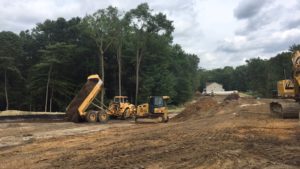
When working to construct a solid foundation for a project, sitework contractors and excavation and grading professionals must consider a variety of different factors to ensure stability over time. One of the factors that engineers and construction professionals must consider is the type of soil or fill material that is being used. Clay, sand, and other substances all react differently to pressure, moisture, and time, making them beneficial or hazardous to a project’s foundation depending on the amounts present.
Clay and Peat
Clay and peat are expansive soils. This means, as the term would suggest, that they can expand under certain conditions. Both peat and clay expand when wet and contract when dry. While most soils have some concentration of clay or peat within them, building a foundation on a surface that is mostly composed of expansive soils can lead to complications. Because they expand, shift, and shrink with changes in moisture, expansive soils can cause foundations to experience a great deal of pressure and eventually crack. Furthermore, peat has an exceptionally low capacity for bearing weight.
Sand
Sand is another substance that makes an excellent component of fill material but presents complications when used on its own beneath a project’s foundation. Unlike expansive soils, sand does not absorb water. However, grains of sand have the ability to lose their rough edges over time, allowing the foundation to settle or the sand to be washed away. Sand is also particularly dangerous to build on in areas that are prone to earthquakes. While sand can present challenges, there are a few stabilization methods available that allow for construction on sandy ground.
Loam and Stone
Loam is a soil mixture that is made of clay, silt, and sand, and it is a particularly desirable surface upon which to build a foundation. While the clay component of loam can expand slightly when exposed to moisture, this does not typically present significant issues. Stone can also be an excellent surface for construction. While some varieties of rock have exceptionally high capacities for bearing weight, grading is particularly important when working with stone. If the surface is not perfectly level, anchors may be necessary to hold the foundation (and everything on top of it) in place.
ABOUT RELIABLE CONTRACTING
Reliable is dedicated to delivering quality products, displaying professionalism within the firm, seeking new opportunities for expansion and profitability, and providing an environment for individual success. If you have a commercial or residential construction project that you need taken care of, please contact Anne Arundel County’s largest site-work contractor today by calling 410-987-0313 or visiting our website. You can also follow Reliable Contracting on Facebook, LinkedIn, Pinterest, and Twitter!
Reliable Contracting Company serves the following and surrounding counties: Annapolis, Queen Anne’s, Anne Arundel, Baltimore, Baltimore City, Calvert, Caroline, Charles, Howard, Prince George, St. Mary’s, Talbot, and Washington D.C.
